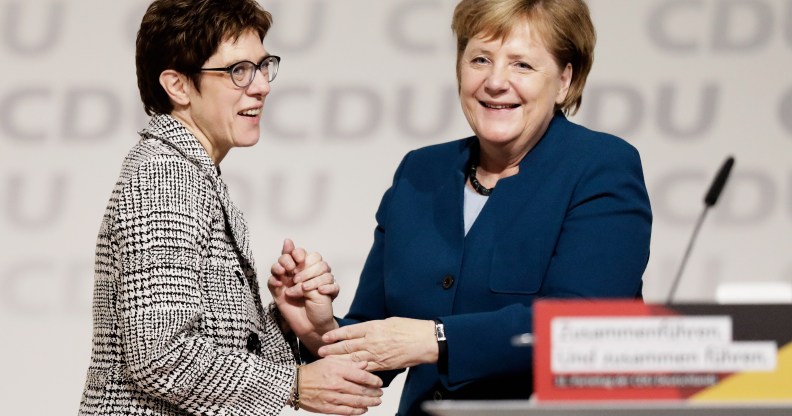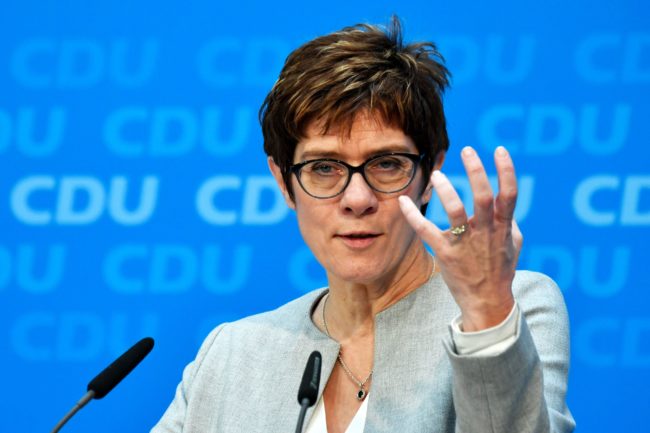Merkel successor Annegret Kramp-Karrenbauer mocks gender-neutral toilets

Annegret Kramp-Karrenbauer is congratulated by Angela Merkel after receiving the most votes to become the next leader of the German Christian Democrats (CDU) at a federal congress of the CDU on December 7, 2018 in Hamburg, Germany. (Carsten Koall/Getty)
German Chancellor Angela Merkel’s political successor, Annegret Kramp-Karrenbauer, is under fire for inflammatory comments about gender-neutral toilets.
Kramp-Karrenbauer, who replaced Merkel as leader of the right-wing Christian Democratic Union (CDU) in December, claimed that the “latte macchiato faction” were responsible for “installing third-gender bathrooms.”
Addressing an audience at a televised comedy event on February 28, the political leader claimed that gender-neutral bathrooms are “for the men who can’t decide if they want to sit or stand when they pee.”
The comments were blasted by LGBT+ campaigners and lawmakers across the political spectrum.
Annegret Kramp-Karrenbauer faces backlash over ’embarrassing’ toilet humour
On Twitter, Berlin’s deputy mayor Klaus Lederer of The Left party branded the comments as “homophobic” and condemned the politician for “denouncing people who do not correspond to the masculine ideal.”
Free Democrats lawmaker Jens Brandenburg also hit out at the “embarrassing” comments, accusing Kramp-Karrenbauer of “attacking minorities” for a cheap joke.

CDU leader Annegret Kramp-Karrenbauer addresses a press conference on January 29, 2019 in Berlin. (JOHN MACDOUGALL/AFP/Getty)
The head of the CDU’s own gay and lesbian association, Alexander Vogt, called for an apology.
According to the Guardian, he said: “Of course we are owed an apology.
“If [her comments] happened without thinking, then it’s a sign of how common this kind of thinking is across the country.”
Although Kramp-Karrenbauer has become head of the CDU party, Merkel remains Chancellor and has vowed to serve out much of her remaining term.
Annegret Kramp-Karrenbauer was named Miss Homophobia 2018
Although Merkel has permitted LGBT+ rights reforms during her four terms as Chancellor, Kramp-Karrenbauer has a poor record on the issue and was crowned “Miss Homophobia 2018” by the LGBT+ rights group Enough is Enough.
In a statement, the group branded her “the most homophobic public figure in Germany,” noting previous comments comparing same-sex marriage to incest and polygamy.
Speaking in 2015, Kramp-Karrenbauer had warned: “If we open up this definition [of marriage] to become a long-term responsible partnership between two adults, then other demands can’t be ruled out, such as a marriage between close relatives or between more than two people.”
Kramp-Karrenbauer also opposed adoption rights for same-sex couples, adding: “The traditional family unit is the core of not only Germany but all nations”.
Same-sex marriage was introduced in Germany in 2017, when Chancellor Merkel agreed to allow legislation to proceed despite personally cast her own vote against.
Germany added a legal third gender to birth certificates in December, though the option is limited to intersex people and not open to those who identify as non-binary.

